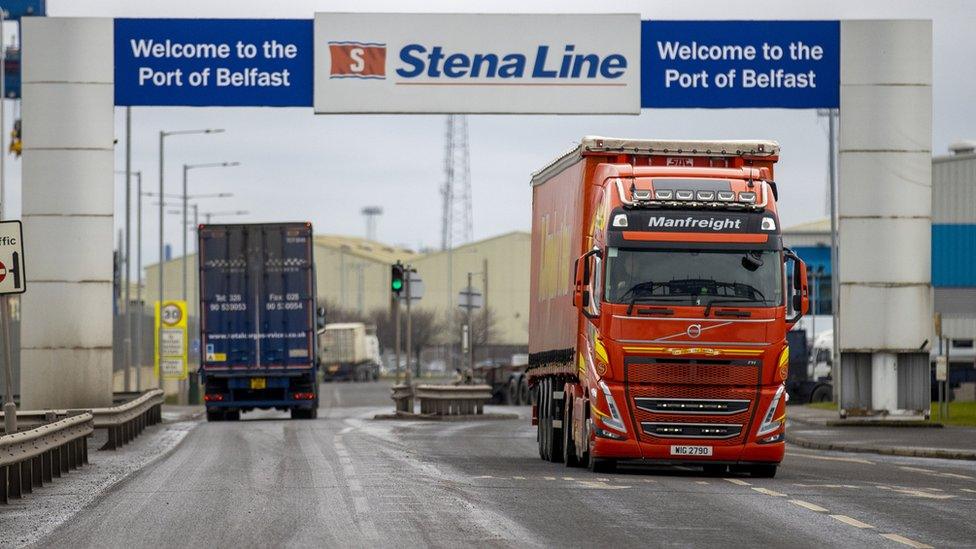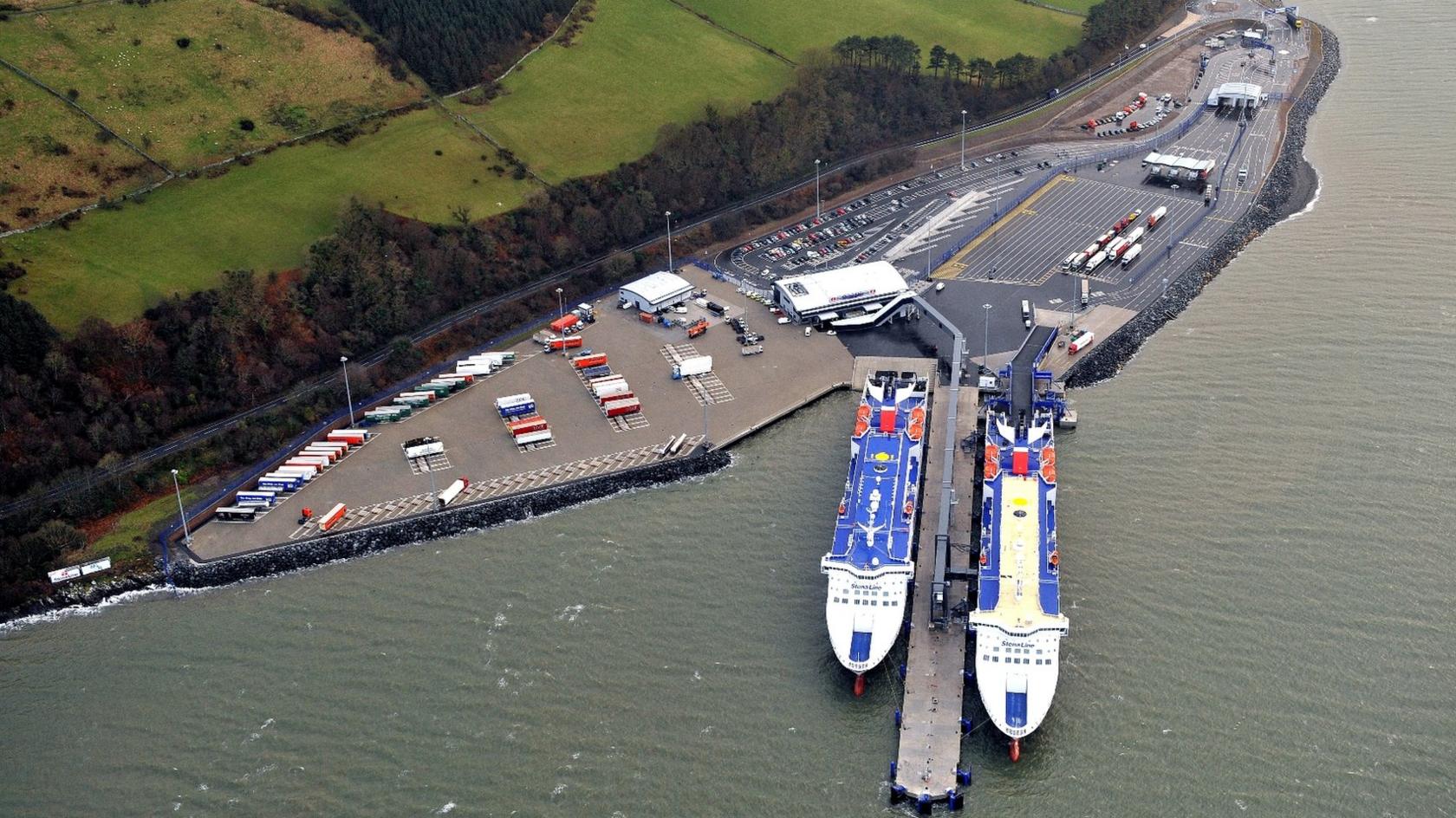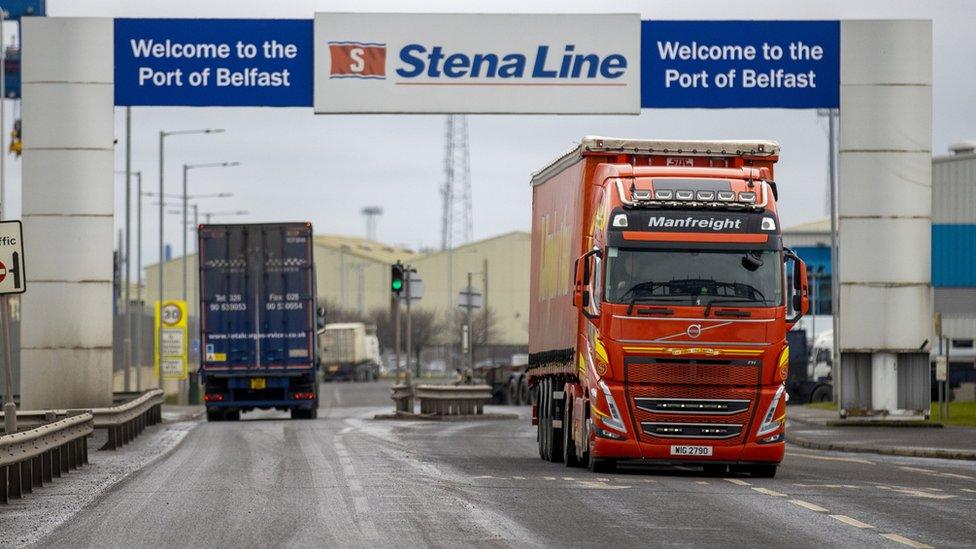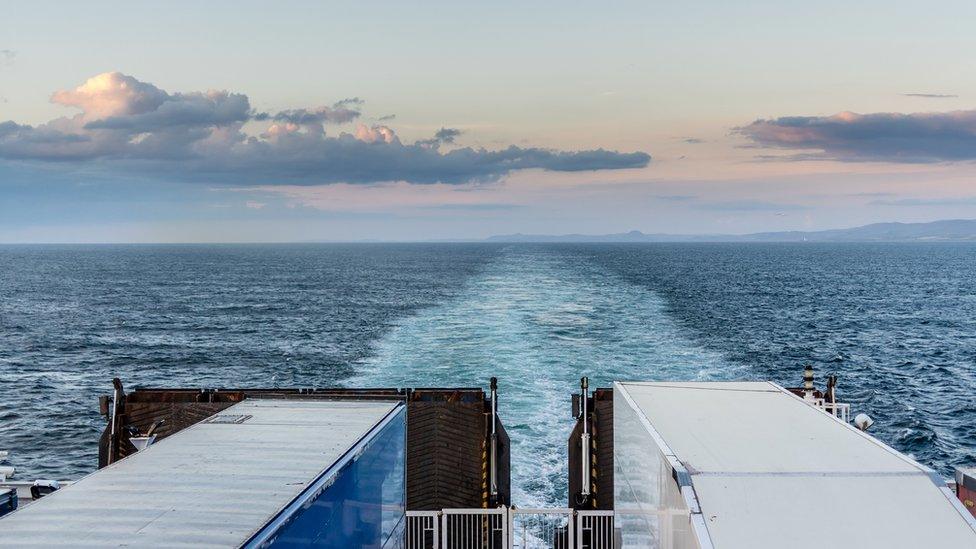Brexit: Government sets out tighter rules to stop mislabelling of food
- Published

The government has announced a tightening of post-Brexit rules for moving goods from NI to Britain.
It concerns the definition of which goods qualify for "unfettered access" when moving to the rest of the UK.
The rules around the movement of food products are being tightened after feedback from the food industry.
It expressed concerns that goods made in other countries could simply have been relabelled in Northern Ireland to get unfettered access to GB.
Stuart Anderson, head of public affairs at Northern Ireland Chamber of Commerce, said agri-food businesses will welcome that additional protections are proposed to qualify for unfettered access to the British market.
"Upholding the twin objectives of preserving barrier-free access to GB whilst protecting the integrity of Northern Ireland's world-renowned produce will be critical," he said.
Focus on NI traders
The definition of qualifying goods is currently very wide and the government had always intended to narrow it.
Unfettered access for Northern Ireland goods was a central Brexit promise from the UK government.
Prime Minister Boris Johnson famously told Northern Ireland businesses that if anyone asked them to fill in a form for moving goods to GB they should throw it in a bin.
In November 2019, he said: "There will be no forms, no checks, no barriers of any kind - you will have unfettered access."
That promise is given legal form by the Qualifying NI Goods Regulations which say that any goods that are in free circulation in Northern Ireland count as qualifying.
For most goods that will remain the case but food and animal feed products will need to be owned or processed in NI by an NI registered business in order to be considered a qualifying NI good.
The government says this is to "ensure the benefits of unfettered access are more squarely focussed on Northern Ireland traders".
It added that Northern Ireland food manufacturers are already required to register with their district councils or to be approved by the Food Standards Agency so the rules place "no new burdens on Northern Ireland businesses".
Vague on enforcement
Food products which don't meet the qualifying rules will need to be declared before being sent to GB and may require official certification and be subject to checks at GB ports.
The new rules will apply from the end of January 2024. However, the government is still vague on enforcement.
It said: "We will ensure measures are in place to prevent avoidance of sanitary and phytosanitary import processes and, therefore, abuse of the arrangements for Northern Ireland's unfettered access to the GB market.
"Where traders move goods for an avoidance purpose and therefore seek to bypass import checks and controls where these are required, traders may be subject to financial penalties and enforcement action, up to and including seizure, destruction or criminal sanction."
It added that it will work closely with the Scottish and Welsh governments on this issue "and further details will be provided in due course".
Cairnryan border control post 'uncertain'
The major difficulty around enforcement is how to impose controls on non-qualifying goods without interfering with with the free flow of qualifying goods.
There is also still uncertainty whether a new facility, known as a Border Control Post (BCP), will be built at Cairnryan port in Scotland to any check non-qualifying goods which arrive via NI.
In 2021, the Scottish government announced plans to build a new BCP at Cairnryan.
But a funding dispute with the UK government has stalled work on it.
In the UK government update published on Tuesday Cairnryan was not on the list of current and planned BCP's in Scotland, with a note from the UK government adding "we are working with the Scottish government to determine how and where any necessary checks can be conducted in a proportionate way".
Meanwhile, the government says it also intends to simplify the process of moving qualifying NI goods to GB via ports in the Republic of Ireland.
The government says hauliers will still need to use the Goods Vehicle Movement Service (GVMS) to move goods on this route but "in the vast majority of cases" will no longer need to complete electronic import customs declarations.
They will need to have access to "commercial evidence" if asked to confirm that their goods are Qualifying Northern Ireland Goods.
The government says more guidance will be provided on this later.
The updates come as the government confirmed post-Brexit checks on agri-food products coming to GB from the EU have been delayed again.
New import controls on EU food products had been due to begin in October.
Under the new plan these goods will need official certification from the end of January 2024, with physical checks starting at the end of April.
Checks on goods coming from the Republic of Ireland have been further delayed until the end of October 2024.
Related topics
- Published14 May 2023

- Published27 February 2023

- Published1 September 2021
